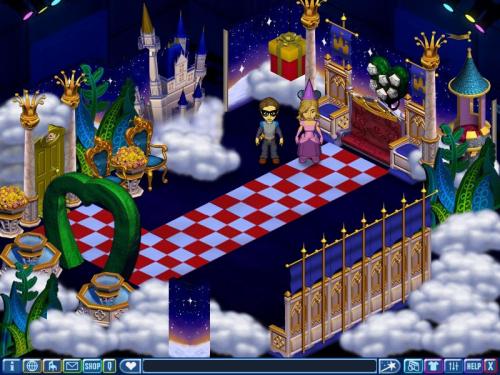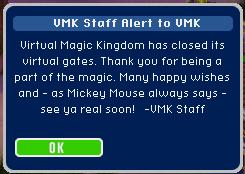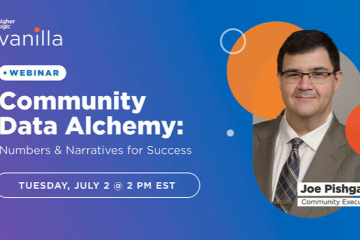We talk a lot about growth from the community angles when we look at new avenues of expansion, but I’d like to take a moment to discuss another part of the life cycle of a community – namely, a community’s death. I consider myself fortunate to have been in a position to oversee the construction of some really fantastic communities and study the anatomy of how to put them together from the ground up. But I’ve also been asked to shepherd a couple to the grave, and there are some dark lessons that watching a community die can teach you that cannot otherwise be learned. I’d like to share some of that experience with you, and my takeaways from it.
Before my time with Bestofmedia (now Purch,) 7 or so years ago, I was the Community Manager for Disney’s Virtual Magic Kingdom. Virtual Magic Kingdom (VMK) was a unique online social game with a half-million players from the tween age group. As a social space goes, it was remarkable in that it had a dictionary-based chat that precipitated a language all to its own. “I glove my duh.duh” was “I love my dad” in the restriction of speech allowed. Language, meme and tropes are the first icons of culture, and VMK’s would take any newcomer a while to get the hang of. The environment of VMK was definitively Disney, but a softly diluted version with non-brand characters. It was an emulated model of the physical Magic Kingdom where kids could congregate and go on adventures and share stories. The Production Team kept the world rich with frequent updates driven by community input, with new clothing, items, rooms, contests and events, content that most subscription-paying users would envy.
Players coordinated events and room hosting, playing games in the freeform social space provided them in exchange for increased brand awareness. Tweens, predominantly female, occupied the majority of the demographic. My spectacular moderation team was entirely contracted, with many pedigrees in AOL’s Guide Program, background checked and kept to a tight schedule for strict compliance with COPPA (Children’s Online Privacy Protection Act). VMK’s unique flavor is tough to describe without evoking the movie “Legend” from the 80’s that starred Tom Cruise before he went all couch-jumpy. There’s a scene in it with a reverb synth riff playing Tangerine Dream in sopping, high breathless pace over piano as a unicorn romps around in a sun-dappled forest. A dirty and brilliant light, filled with dust and kicked-up earth and Good, and entirely unrealistic. That’s the most accurate description I can give for the environment and culture of VMK – a sweet contrivance of intentional means.
In light of the growth the game was still experiencing, the announcement that it was being closed came unexpectedly. The reasoning was that the promotion had come to an end. Community’s eminent task was to effect a peaceful termination of the game on the final day, and to manage expectations about the closure. The kids responded as you might expect them to, feeling like the rug had been pulled out from under them. Not only was the matter a tricky one, but this was uncharted territory. The destruction of a virtual world hadn’t happened in recent memory. There were no articles I could read, no post-mortems, very little in the way of industry group shared knowledge about what to do or expect as a community of such size approached the event horizon of an intentional shutdown. Compounding the issue was that this particular demographic was surprisingly prone to acts of self-violence, and there exists a duty to report under COPPA. The announcement was made public, and the effects were seen almost instantly.
I watched close while the presence of the cornerstone users of the community atrophied and collapsed. Emotionally charged discussions flared and new emergent behavior could be seen right up until the final hour. Up to that point, I’d kept deeply behind-the-scenes in my day-to-day. Super-public Community Managers often end up serving their egos rather than their community’s real needs – so I squash cults of personality for Mods, Admins and Community Managers when and where I can. With these circumstances though, the approach of a quiet, benevolent advocate had to take a back seat to direct involvement. After all the community initiatives were cancelled, I reset the priority for my staff to be the continuance of the VMK community in some fashion beyond the destruction. We scrambled to secure swift alliances with third-party forums, transitional tokens for alternate games, and a loosening of identifiable information restrictions so that players could exchange character names in other games or social spaces. For many of these kids who had called VMK their digital home for years, they had found in it their own support mechanism, and community had to persist. It simply had to. There were battles fought right up to the very end to ensure the game came to an end on a respectable note, and that its little citizens were treated with dignity.
The closing itself was spun as a graduation, and I visited as many player rooms and public places in the game world as I could, as the “rare” moderator no one had ever seen before. I provided consolation and went to all the foremost players that remained – those brave little souls in-game right up until the switch was set to be turned off.

One of them was a little girl named Madison Reed. Madison had Spinal Muscular Atrophy and suffered from the effects of the disease bound to a wheelchair her entire life. She defied the odds when she did not die after turning 2 years of age, and was 11 years old playing VMK as a little princess in a pink dress. She loved VMK because, as she told us, she “could dance and have fun parties with her friends and didn’t even have to worry about germs at all.” She was in the game on the final day, decorating her castle suite room with flowers and setting up for a tea party. I stopped by and introduced myself. We spoke and I answered her concerns and questions, and she asked if we could pose for a picture so she could remember the day. It was the final 20 minutes and things were coming to a wrap, so after the picture, I said I had to get going with other rooms to visit. Without warning, she approached my avatar in-game and thanked me with a hug. And then, at random, she danced. I hit the dance emote button and joined her. And for a time, we just danced.

In the final moments, without planning, players gathered in all zones throughout the game to form a long line of dancing kids. I met the end of VMK shaking my avatar’s little pixels in a dance at the far right of an impossibly long line of players who had gathered at the statue of Walt & Mickey in the Castle Forecourt.
The end cast a great many things into perspective for me, and I’ve applied these truisms gleaned from the finality of a world where the girl who could not dance, danced. Community, capital-C, is a lot of things to a lot of people. The preservation and constancy of community and the bonds that are formed by users is always, always the utmost priority for me and for my team, because these are more than just pageviews, subscribers, or registrations. These are folks who lean on their online friends for emotional support when a family member has been diagnosed with a terminal disease. These are plucky, young PC techs in Iran trying to get their tweets out through the crushing weight of a state-monitored ISP. These are people, and their relationships matter.
Community is where we celebrate hardship, joy, pain, wonder, and share comradery. It sustains and betters us, as the sum of us. It is the essence of collective endeavor and the support of others. It empowers us to do so much more than we could individually, whether that’s answering a question about your system build, figuring out what lawnmower to buy, or meeting the end with courage, and a silly little dance.
Yours,
Joe Pishgar


